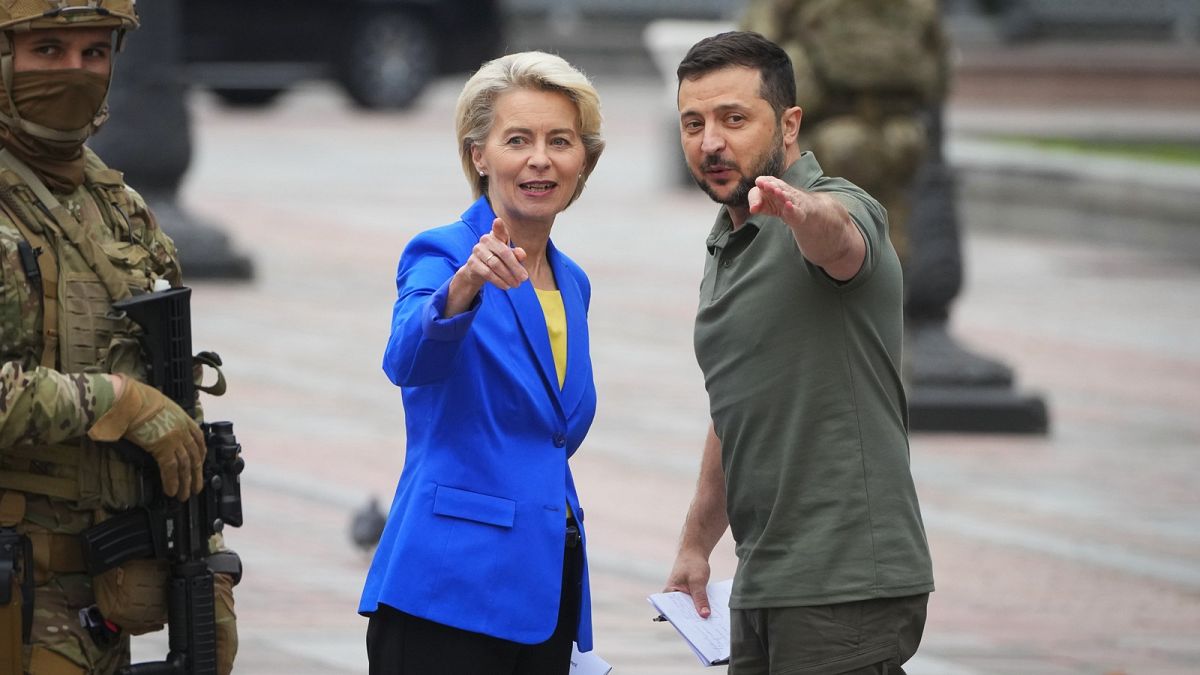The macro-financial assistance is meant to help Ukraine cover its budget deficit and keep its economy running.
Back on 18 May, Ursula von der Leyen, president of the European Commission, appeared before journalists in Brussels and announced, among other things, a new plan to provide Ukraine with €9 billion in financial assistance to cover the war-torn country's budget deficit and keep its economy running.
"This is for the short term, for the relief right now, to support the government, this is a budget support," von der Leyen said then.
Almost half a year later, the package remains stuck in negotiations between countries, with just €3 billion sent to the Kyiv authorities. Meanwhile, Russian forces continue their assault on Ukraine, destroying essential infrastructure and leaving cities without power and running water.
The extended delay earned a stern rebuke from Ukrainian President Volodymyr Zelenskyy.
"Thank you for the funds that have already been allocated, but a decision has not yet been made on the remaining €6 billion from this package – which is critically needed this year," Zelenskyy told EU leaders in a video speech broadcast during last month's European Council.
"It is in your power to reach a principled agreement on the provision of this assistance to our state."
So far, the EU has released €4.2 billion in macro-financial assistance to Ukraine: €3 billion of the package promised by von der Leyen, together with a €1.2 billion emergency disbursement earlier this year.
A second tranche of €3 billion is expected to be announced in the coming days, Euronews understands, while no date has been set for the remaining €3 billion.
That very last tranche is all but guaranteed to be transferred to 2023.
"Work on the remaining €3 billion is ongoing," a European Commission spokesperson said on Monday.
In Brussels, officials dismiss criticism and insist there has been no actual delay, despite the slow pace of payments and Kyiv's repeated pleas.
But moving forward, both the European Commission and diplomats say the EU must abandon this case-by-case approach and adopt a more reliable and predictable method to help Ukraine buttress its national budget.
The International Monetary Fund has estimated that, for 2023, Kyiv will need between €3 billion to €4 billion in foreign aid on a monthly basis to sustain its public services, an enormous amount that would have to be shouldered by international donors, mainly from the West.
"The main thing is to speed up the aid now," Finland's Finance Minister Annika Saarikko told Euronews before heading to a meeting of eurozone ministers. "The winter is coming and the situation is not easy."
Grants vs loans
As a budgetary matter, the extraordinary financial assistance has to be unanimously approved by the 27 EU countries, a requirement that can easily complicate collective decision-making.
The money does not come from a specific line of the EU budget, which has no space left for this year and is instead being raised on capital markets by the European Commission on behalf of all countries.
The executive is essentially creating this cash out of thin air by issuing fresh common debt.
The aid is then transferred to Ukraine in the form of favourable loans, which are linked to a series of policy goals, such as economic stability and the rule of law, that Kyiv needs to fulfil.
According to diplomatic sources, Germany has pushed to transform these loans into grants, arguing Ukraine's ravaged finances will not be able to cope with the repayment of credits.
Berlin also tried to add the aid provided on a bilateral basis to the EU's total calculation. Back in May, the German government pledged €1 billion in grants to Ukraine.
The United States has released macro-financial assistance in the form of grants, which do not need to be repaid in the future and therefore alleviate Kyiv's financial burden.
A European Commission spokesperson told Euronews that EU schemes of macro-financial assistance (MFA) are usually structured as long-term loans, rather than grants, and entail the issuance of fresh common debt.
Previous MFA recipients include Albania, Jordan, Moldova, Georgia and Tunisia, none of whom were ever awarded a sum higher than €1 billion.
Given Ukraine's exceptional circumstances, the maturity of these loans has been extended from an average of 15 years to a maximum of 25 years.
Interest rates are covered by the EU budget, while 70% of the credit's value is guaranteed by the bloc and its member states, an unprecedented rate meant to offset Ukraine's high risk of default.
As the EU works to break the impasse and disburse the remaining funds throughout 2022, a new package of €18 billion has already been announced for 2023.
In practice, this would amount to €1.5 billion a month for Kyiv, the same amount pledged by the United States.
"The EU will be at Ukraine’s side for as long as it takes," von der Leyen tweeted on Sunday after holding a phone call with President Zelenskyy, in which the €18 billion were discussed.
This larger envelope is expected to be entirely made up of highly concessional loans. More details will be unveiled later this week.
Speaking to reporters on Monday, Christian Lindner, Germany's finance minister, said next year's financial package should be more understandable and better defined to address Ukraine's liquidity needs. Lindner was commenting on media reports and did not specify a preference for either loans or grants.
But Péter Szijjártó, Hungary's foreign affairs minister, put his foot down.
"We are ready to continue financial support on a bilateral basis [...] but we will certainly not support any kind of joint EU borrowing in this area," Szijjártó said on Monday.
"Why? Because we did it once. We supported joint borrowing during the coronavirus epidemic, but that was more than enough."
